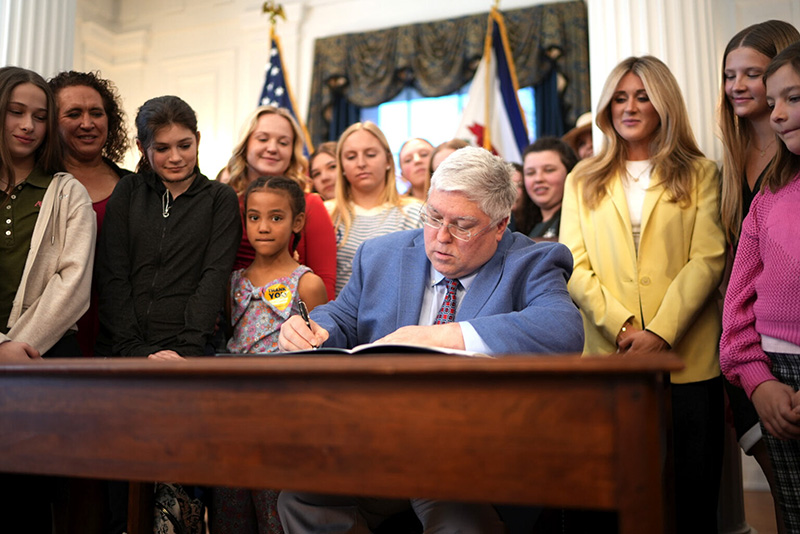Tennessee forces private businesses to post “warning signs” if they have trans-friendly restrooms
New law singles out establishments that accommodate transgender customers, in hopes of shaming them or costing them business.

Tennessee will become the first state in the United States to require private businesses and government facilities open to the public to post warning signs if they allow transgender people to use multi-occupancy bathrooms, locker rooms, or other facilities matching their gender identity.
The bill, signed into law by Gov. Bill Lee (R) on Monday, will mandate that businesses with trans-friendly accommodations post yellow and red “warning” signs reading: “This facility maintains a policy of allowing the use of restrooms by either biological sex, regardless of the designation on the restroom.”
The law, which goes into effect on July 1, is the first of its kind to be passed by a state legislature, according to the Human Rights Campaign, which has been monitoring the hundreds of anti-LGBTQ bills introduced in more than 30 state legislatures this year.
Despite claiming he had “concerns about business mandates,” Lee signed the bill into law, meaning that establishments that allow transgender people to use multi-occupancy bathrooms, locker rooms, or other facilities matching their gender identity will have to post the signs, which activists have characterized as “offensive and humiliating,” according to The Associated Press.
Lee defied requests from LGBTQ groups, including the Log Cabin Republicans of Tennessee, who pleaded with the governor not to sign the “misguided” bill, which they said singles out businesses “for special public censure.”
The conservative LGBTQ group also argued that the bill takes a specific side on a controversial, emotionally-charged issue, and may even be counterproductive to conservatives’ aims of keeping transgender people out of restrooms that match their genitalia or outward appearance — especially if a customer is further along in their transition.
Due to concerns expressed by some more conservative-leaning business associations, the law doesn’t elaborate on how it will be enforced, or any fines, penalties, or other actions that can be taken to ensure the signs are posted as required by the law.
Rep. Tim Rudd (R-Murfreesboro), the sponsor of the bill, says that while no state agency will oversee compliance with the law, local district attorneys could seek a court order to force establishments to post the sign if businesses refused to comply. Rudd also argues the bill is necessary to protect customers’ bodily privacy.
“Whether you’re a man or woman, don’t you want to know who might be waiting on the other side of a bathroom door when you go in?” Rudd said in a statement. “Everyone has a reasonable expectation to the right of privacy and dignity when using the restroom.”
Related: Tennessee’s “Slate of Hate” features 11 bills targeting LGBTQ people
The American Civil Liberties Union of Tennessee slammed Lee for passing the bill, and warned that the measure is unconstitutional and will likely be challenged in court. The ACLU called the bill “impermissible compelled speech, in violation of the First Amendment,” and said it “raises substantial due process and equal protection concerns.”
Meanwhile, LGBTQ activists, as well as business owners who will be forced to install the specific signs in their establishments, say the sign requirement is just another burdensome mandate to deal with, is unnecessary, and paints a target on businesses with trans-friendly restroom policies, potentially costing them business from customers who do not wish to share multi-user facilities with a transgender person.
Lee has recently signed a slew of anti-LGBTQ bills into law, including a first-of-its-kind bill that allows school districts to be sued if a cisgender person sees a trans person entering, using, or exiting a multi-user restroom or other facility that does not match their assigned sex at birth.
He also signed a bill barring transgender athletes from competing on sports teams matching their gender identity, and another requiring school districts to alert parents 30 days in advance — allowing them the chance to “opt out” of a lesson — before sexual orientation or gender identity can be mentioned, even in passing or in reference to historical facts.
A bill that bans transgender minors from accessing gender-affirming medical treatments is awaiting Lee’s signature. But even if Lee chooses to veto the bill for infringing on parental rights and private medical decisions, Republicans in the legislature have the numbers to override a gubernatorial veto, as lawmakers in Arkansas did earlier this year.
Joe Woolley, the CEO at the Nashville LGBT Chamber of Commerce, said that the passage of the anti-LGBTQ bills could have economic consequences, especially if businesses choose to leave the state or scuttle plans to relocate to the state out of fear that the perceived hostility of the state will make it harder for them to attract talented or hard-working employees, especially members of the LGBTQ community.
“Tennessee businesses once again made it clear where they stand in opposing discriminatory legislation. We saw record levels of mobilization and pushback from the corporate and small business community,” Woolley said in a statement. “Unfortunately, Tennessee legislators told those businesses that their voice and values on this did not matter and to shut up and stay out of politics, and passed a wave of anti-LGBT legislation. These businesses will face the fallout and harm from this discrimination, losing business to those that won’t travel to the state, not being able to attract and retain talent to live and work in the state.”
Sarah Kate Ellis, the president and CEO of the LGBTQ media advocacy organization GLAAD, cited recent polling showing that LGBTQ people are ready to avoid visiting or buying from brands in states with discriminatory laws — providing some potential for backlash.
However, political observers have noted that there has not been the same outcry over anti-LGBTQ bills in various states as there was in 2016, when North Carolina passed a bill to bar transgender people from public restrooms matching their gender identity.
For example, GLAAD recently criticized the NCAA for allowing sporting events to move forward in states where bans on transgender athletes have been passed.
Similarly, in Tennessee, despite vocal opposition from major corporations and business owners, Republican lawmakers remain defiant, continuing to pass anti-LGBTQ pieces of legislation, with few activists calling for the type of boycotts that rocked North Carolina five years ago.
“The devastating anti-transgender bills filed in dozens of states this year accomplish no meaningful outcome other than to diminish the lives of transgender youth and the people who care for them,” Kasey Suffredini, the CEO and national campaign director of Freedom for All Americans, said in a statement. “…These bills are unnecessary, opposed by our nation’s leading businesses and child welfare experts, unsupported by the broader public, and dangerous to some of our nation’s most vulnerable children. We urge state lawmakers to speak with transgender youth, their families, and child welfare experts in order to better understand what it means to be transgender; and reject this legislation.”
Read more:
Queer people more likely to experience negative interactions with police, study says
Support Metro Weekly’s Journalism
These are challenging times for news organizations. And yet it’s crucial we stay active and provide vital resources and information to both our local readers and the world. So won’t you please take a moment and consider supporting Metro Weekly with a membership? For as little as $5 a month, you can help ensure Metro Weekly magazine and MetroWeekly.com remain free, viable resources as we provide the best, most diverse, culturally-resonant LGBTQ coverage in both the D.C. region and around the world. Memberships come with exclusive perks and discounts, your own personal digital delivery of each week’s magazine (and an archive), access to our Member's Lounge when it launches this fall, and exclusive members-only items like Metro Weekly Membership Mugs and Tote Bags! Check out all our membership levels here and please join us today!


























You must be logged in to post a comment.